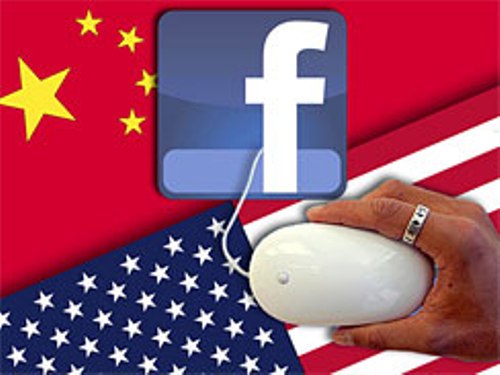Facebook founder and CEO Mark Zuckerberg traveled to Beijing this weekend, where he enjoyed a highly publicized jog through the capital, a discussion with Alibaba chief Jack Ma, and a friendly meeting with propaganda czar Liu Yunshan. In recent years, Zuckerberg has taken a series of actions which have been widely portrayed as an effort to ingratiate himself with China’s leaders in hopes of getting Facebook access to the China market, where it is currently blocked. The meeting with Liu Yunshan was publicized in the official Chinese media, including this report from Xinhua:
Liu said China’s internet industry, after undergoing over-20-year’s development, has taken on a development path of governance with Chinese characteristics.
Liu expressed hope that Facebook, which has advanced technology and governance mode, should work with Chinese internet enterprises to enhance exchanges and share experience so as to make outcome of the internet development better benefit the people of all countries.
Zuckerberg, who is in Beijing to attend the annual meeting of the China Development Forum, spoke highly of the progress China has made in internet field, saying he would work with Chinese peers to create a better world in cyberspace.
Senior Chinese official Liu Yunshan met with Facebook’s Mark Zuckerberghttps://t.co/0PpMtIgQEo
— CGTN (@CGTNOfficial) March 20, 2016
In 2014, when Zuckerberg welcomed “Cyberspace Minister” Lu Wei to Facebook headquarters, he placed a copy of Xi Jinping’s “Governance of China” in plain sight, a move that was widely mocked online. Paul Mozur reports for The New York Times on Zuckerberg’s unusual approach for dealing with the Chinese government:
The visits have cemented his place as one of the best-known foreign business executives in China. But it is far from clear whether his charm offensive will unlock Mr. Zuckerberg’s ultimate goal: persuading the Chinese government to lift its ban on the social media service and open it to the country’s almost 700 million Internet users.
Courting Chinese leaders in such a public fashion is an unusual strategy for a foreign executive. With star power comes influence, and any clout not directly controlled by the Chinese Communist Party can be deemed dangerous. China demonstrated this last month, when a widely read social media account of a prominent real estate tycoon disappeared after he criticized Mr. Xi’s call for unswerving loyalty from the country’s media.
The few American technology firms that have entered China in recent years have played down their efforts. Though Travis Kalanick, a founder of Uber, frequently travels to China, news of his presence rarely spreads across the Chinese Internet. There was almost no fanfare in advance of LinkedIn’s deal with two closely connected Chinese venture capital shops to enter China, an event that was marked with a blog post.
If Mr. Zuckerberg succeeds, it could show other foreign companies blocked in China that they have a potential path into the huge and fast-growing market — one that calls for them to accept China’s strict controls on discourse and to refrain from rocking the boat. A failure would underscore Chinese distrust of foreign technology companies and cement the idea that the low-profile approach is the only way to gain market access. [Source]
For Tech in Asia, Erik Crouch writes about the risks inherent in Zuckerberg’s approach and why other companies haven’t taken the same tack:
And from all the signs so far – the meetings with Chinese leaders, the comments about Xi Jinping that could have just as easily come from state mouthpiece, the People’s Daily – he plans for Facebook to work hand-in-hand with the nation’s government.
This seems to underestimate the seriousness of China’s politics. Facebook wasn’t blocked because of a simple misunderstanding. It was blocked because Xinjiang independence activists were using it to organize. Google didn’t leave China because Eric Schmidt’s Mandarin sucked; it left because the Gmail accounts of human rights activists kept getting hacked.
The Chinese government is outwardly hostile to foreign internet companies, especially those that won’t A) Censor information and communications and B) Turn over information about political dissidents without due process.
In the Western press, the strength of ideology among China’s leadership is often downplayed. The Party is cast as simply a bunch of stability-loving capitalists who still call themselves a “Communist Party” out of force of habit. But this is a country whose leadership refers to the internet as “the primary battlefield for ideological struggle” and sees the nation’s media as a tool to “protect the party’s authority and unity.” In other words, politics matters to these people – and they’re not going to drop everything because a foreign CEO can get his Mandarin tones pretty much right. [Source]
Meanwhile, over on Twitter, journalists and others had some fun with Zuckerberg’s visit, especially his jog through Beijing without a face mask while pollution levels were “hazardous”:
Mark Zuckerberg listens attentively to the wisdom of Jack Ma. https://t.co/CZ7McWUAOt pic.twitter.com/k7WUTpNU7m
— Chris Buckley 储百亮 (@ChuBailiang) March 20, 2016
Zuckerberg Shows How Much He Loves China By Running in AQI 337 Air Without a Mask https://t.co/h8ICFsnnrA pic.twitter.com/YJzLG1oSGJ
— ?Fergus Ryan (@fryan) March 18, 2016
Zuckerberg-keen to be positive on China-posts blithely about what must have been a lung ripping smog jog in Beijing. pic.twitter.com/WpRSeiIk36
— Paul Mozur (@paulmozur) March 18, 2016
China peeps: I think we should start a meme on what Zuckerberg will do next to ingratiate himself to Beijing. https://t.co/nD4vRrhEc6
— Melissa Chan (@melissakchan) March 19, 2016
vvv this tweet right here basically sums up the whole situation nicely https://t.co/UyFrRws9Hj
— Gerry Shih (@gerryshih) March 21, 2016
"Zuckerberg sets a good example for companies seeking business opportunities in China", says country's top censor. https://t.co/Y7RjLzeUsE
— Ben Dooley (@BenjaminDooley) March 21, 2016
.@sharonodea @jenn1marsh @phila_siu Why has no-one made this obvious photoshop yet?….. Allow me: pic.twitter.com/nz2SzJynpW
— Tom Grundy (@tomgrundy) March 18, 2016
Correction: An earlier version of this post misidentified Alibaba founder and executive chairman Jack Ma.







